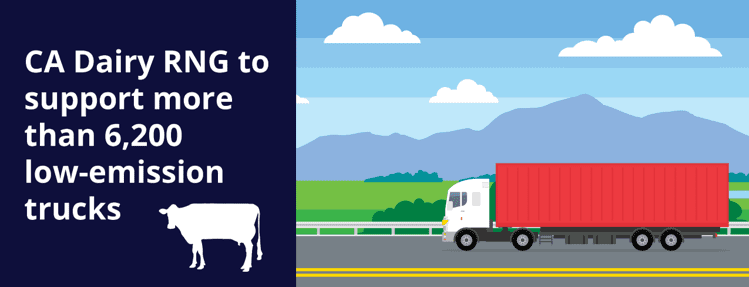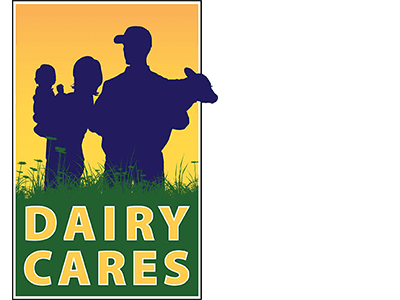There’s a new wave of renewable fuel, and it’s coming from California’s family dairy farms. As the state works toward ambitious climate and clean energy goals, renewable natural gas (RNG) is the leading alternative to diesel in heavy-duty trucks—significantly reducing greenhouse gas emissions and improving air quality. Until recently, most of the RNG consumed by California vehicles came from out-of-state sources, mainly from landfills. However, California’s dairy farmers are partnering with the state and private investors to build valuable infrastructure and provide a new fuel source that benefits the local environment, the state’s economy, and the climate.
A First for California, With More to Come
As a growing number of the state’s family-owned dairy farms install digesters that capture methane, millions of metric tons of greenhouse gas emissions are being reduced. Additionally, the biogas is being collected, cleaned and conditioned, and then injected into the state’s natural gas pipeline. In 2019, Calgren, a biogas company based in Pixley, became the first project in California to inject dairy biogas into the natural gas system. Calgren currently collects biogas from ten neighboring dairy farms, with more to be added. The project represents only the first surge of dairy biomethane that is expected to come online in the next three to four years.
As a growing number of the state’s family-owned dairy farms install digesters that capture methane, millions of metric tons of greenhouse gas emissions are being reduced.
Similar developments are under way throughout the San Joaquin Valley, where neighboring dairies will soon be sending biomethane to centralized injection hubs. There are currently 34 digesters operating on California dairy farms, with another 95 in various stages of development. Most of the developing projects are designed to inject biomethane into natural gas pipelines, making a significant contribution to California’s robust supply of RNG that is being used to replace the use of diesel. This year, the state has allocated another $34 million for dairy methane reduction grants—expected to fund about twelve more digesters, in addition to other projects.
Improving Air Quality at the Local Level
This new, clean fuel source will make a tremendous difference in the San Joaquin Valley, where dairy farms play an important role in the economy. About 180,000 California jobs are attributed to the dairy industry—on dairy farms, in processing facilities, and throughout the supply chain. More than half of those jobs are located in the San Joaquin Valley. Not only are dairy digesters helping farmers meet the state’s climate goals; they are also helping improve air quality for local dairy families, employees, and communities.

With dairy biogas projects funded to date, an estimated 60 million diesel gallon equivalents (DGE) of fuel will be produced each year. That’s enough fuel to support more than 6,200 RNG trucks. By using this new fuel source, oxides of nitrogen (NOx), a component of smog, will be reduced by an estimated 650 to 1,320 tons each year, depending on the age of diesel trucks being replaced. This cleaner burning fuel will primarily be used in the San Joaquin Valley, greatly reducing the amount of air pollution caused by transportation in an area with some of the worst air quality in the nation. The use of RNG throughout the Valley will increase as more projects come online and more fueling stations are built. SoCalGas, the nation’s largest natural gas distribution utility, recently opened a new fueling station in Bakersfield that only dispenses RNG—the largest fueling station to do so in the country. Likewise, Trillium, a leading provider of alternative fuels, has also announced the opening of two new RNG truck fueling stations in Kern County, along essential transportation and goods movement corridors.
This cleaner burning fuel will primarily be used in the San Joaquin Valley, greatly reducing air pollution caused by transportation in an area with some of the worst air quality in the nation.
California’s Dairy Farms Lead the Way
The capture of methane and use of renewable natural gas is a win-win for farmers and the state. California dairy farmers are working toward a world-leading goal to reduce dairy manure methane emissions by 40% below 2013 levels by 2030. Through the implementation of digesters and other dairy methane reduction projects funded to date, the California Department of Food and Agriculture (CDFA) estimates 2.2 million metric tons of greenhouse gases will be reduced each year. That’s approximately 25% of the 2013 California inventory for dairy and livestock manure methane emissions—a reduction that takes dairy farms more than halfway to reaching the 2030 target. With continued investment by the state, dairy farmers, and private companies, this goal will be achieved, reducing climate impacts, while generating even more clean-burning RNG.
This success demonstrates great collaboration between dairy farmers, state officials, researchers, and the private sector. The state has provided more than $500 million in grant funding to date, which is being matched by even more funding from dairy farm families and private financers. The methane reduction goal is one of several ways in which California dairy farms are leading the world in the development of planet-smart farming practices. This includes efforts to boost soil health and water conversation, improve water quality protection, and reduce reliance on fossil fuels. The state’s more than 1,200 family dairy farms continue to improve environmental performance.
California dairy farmers are working toward a world-leading goal to reduce dairy manure methane emissions by 40% below 2013 levels by 2030.
Join us for California Dairy Sustainability Summit 2020
California’s dairy community looks forward to once again welcoming state, regional, and local officials, researchers, technology providers, dairy processors and customers, and other key stakeholders from across the globe to the second annual California Dairy Sustainability Summit, taking place March 25-26, 2020 in Sacramento. A key topic throughout the event will be dairy’s role in fueling a clean energy future. Key speakers include Kate Gordon, Senior Policy Advisor to Governor Newsom on Climate, and Lenny Mendonca, Director of the Governor’s Office of Business. Join hundreds of California dairy farmers and their collaborative partners, as they discuss advancing clean transportation and other world-leading environmental initiatives.
Dairy farmers are helping the San Joaquin Valley and the state power a cleaner, more sustainable future. Join them at the California Dairy Sustainability Summit, March 25-26, 2020.


